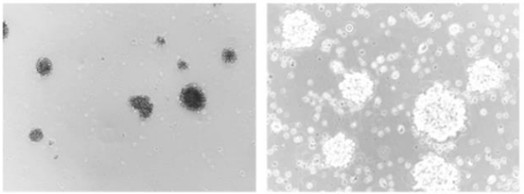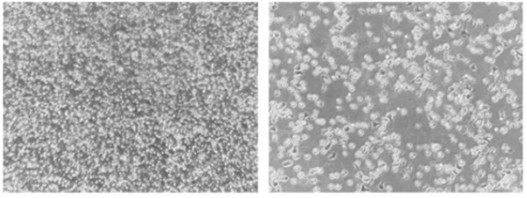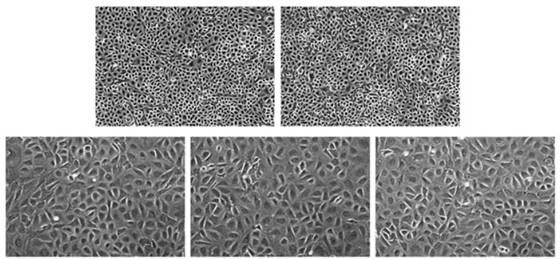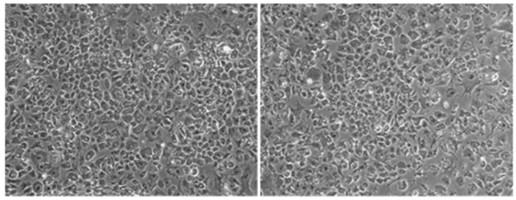- You are here: Home
- Services
- Cell Immortalization
- Epigenetic Induction of Cell Growth Service (Non-Viral Cell Immortalization Method)
Services
-
Cell Services
- Cell Line Authentication
- Cell Surface Marker Validation Service
-
Cell Line Testing and Assays
- Toxicology Assay
- Drug-Resistant Cell Models
- Cell Viability Assays
- Cell Proliferation Assays
- Cell Migration Assays
- Soft Agar Colony Formation Assay Service
- SRB Assay
- Cell Apoptosis Assays
- Cell Cycle Assays
- Cell Angiogenesis Assays
- DNA/RNA Extraction
- Custom Cell & Tissue Lysate Service
- Cellular Phosphorylation Assays
- Stability Testing
- Sterility Testing
- Endotoxin Detection and Removal
- Phagocytosis Assays
- Cell-Based Screening and Profiling Services
- 3D-Based Services
- Custom Cell Services
- Cell-based LNP Evaluation
-
Stem Cell Research
- iPSC Generation
- iPSC Characterization
-
iPSC Differentiation
- Neural Stem Cells Differentiation Service from iPSC
- Astrocyte Differentiation Service from iPSC
- Retinal Pigment Epithelium (RPE) Differentiation Service from iPSC
- Cardiomyocyte Differentiation Service from iPSC
- T Cell, NK Cell Differentiation Service from iPSC
- Hepatocyte Differentiation Service from iPSC
- Beta Cell Differentiation Service from iPSC
- Brain Organoid Differentiation Service from iPSC
- Cardiac Organoid Differentiation Service from iPSC
- Kidney Organoid Differentiation Service from iPSC
- GABAnergic Neuron Differentiation Service from iPSC
- Undifferentiated iPSC Detection
- iPSC Gene Editing
- iPSC Expanding Service
- MSC Services
- Stem Cell Assay Development and Screening
- Cell Immortalization
-
ISH/FISH Services
- In Situ Hybridization (ISH) & RNAscope Service
- Fluorescent In Situ Hybridization
- FISH Probe Design, Synthesis and Testing Service
-
FISH Applications
- Multicolor FISH (M-FISH) Analysis
- Chromosome Analysis of ES and iPS Cells
- RNA FISH in Plant Service
- Mouse Model and PDX Analysis (FISH)
- Cell Transplantation Analysis (FISH)
- In Situ Detection of CAR-T Cells & Oncolytic Viruses
- CAR-T/CAR-NK Target Assessment Service (ISH)
- ImmunoFISH Analysis (FISH+IHC)
- Splice Variant Analysis (FISH)
- Telomere Length Analysis (Q-FISH)
- Telomere Length Analysis (qPCR assay)
- FISH Analysis of Microorganisms
- Neoplasms FISH Analysis
- CARD-FISH for Environmental Microorganisms (FISH)
- FISH Quality Control Services
- QuantiGene Plex Assay
- Circulating Tumor Cell (CTC) FISH
- mtRNA Analysis (FISH)
- In Situ Detection of Chemokines/Cytokines
- In Situ Detection of Virus
- Transgene Mapping (FISH)
- Transgene Mapping (Locus Amplification & Sequencing)
- Stable Cell Line Genetic Stability Testing
- Genetic Stability Testing (Locus Amplification & Sequencing + ddPCR)
- Clonality Analysis Service (FISH)
- Karyotyping (G-banded) Service
- Animal Chromosome Analysis (G-banded) Service
- I-FISH Service
- AAV Biodistribution Analysis (RNA ISH)
- Molecular Karyotyping (aCGH)
- Droplet Digital PCR (ddPCR) Service
- Digital ISH Image Quantification and Statistical Analysis
- SCE (Sister Chromatid Exchange) Analysis
- Biosample Services
- Histology Services
- Exosome Research Services
- In Vitro DMPK Services
-
In Vivo DMPK Services
- Pharmacokinetic and Toxicokinetic
- PK/PD Biomarker Analysis
- Bioavailability and Bioequivalence
- Bioanalytical Package
- Metabolite Profiling and Identification
- In Vivo Toxicity Study
- Mass Balance, Excretion and Expired Air Collection
- Administration Routes and Biofluid Sampling
- Quantitative Tissue Distribution
- Target Tissue Exposure
- In Vivo Blood-Brain-Barrier Assay
- Drug Toxicity Services
Epigenetic Induction of Cell Growth Service (Non-Viral Cell Immortalization Method)
- Overview
- Key Features
- Workflow
- Case Studies
- Explore Other Options
Creative Bioarray is offering epigenetic induction of cell growth service for the cell immortalization. With the Epigenetic Approach, we have established Immortalized Chicken Hepatocytes, Immortalized Monkey Hepatocytes (Cat No.: CSC-I2072Z), Immortalized Dog Hepatocytes and Immortalized Human T Cells (Cat No.: CSC-I2269Z), which their primary cells are very difficult to immortalize in traditional ways. From this experience, Creative Bioarray has much confidence in establishing other Immortalized immune cells (e.g. nature killer cells, Dendritic Cells, CD4+ CD8+ T Cells).
The Epigenetic Induction of Cells Growth is a great method to establish immortalized cell lines that are hard to immortalize in other methods:
| Immortalized Cell Line from Creative Bioarray | Publications Successfully Immortalizing with Other Methods (Yes/No) | Successful Immortalization Using Epigenetic Induction of Cells Growth (Yes/No) |
| Immortalized Chicken Hepatocytes | No | Yes |
| Immortalized Monkey Hepatocytes | No | Yes |
| Immortalized Dog Hepatocytes | No | Yes |
| Immortalized Human T Cells | No | Yes |
Key Features
- No viral genes
- No whole cell fusion like the production of hybridoma cell lines
- Transfer of only non-DNA components
- Human and animal cell lines
- Continuous growth of cell lines
Work Flow

Case Studies
Case 1: Human T Cell Immortalization
In 2023, we established Immortalized Human T Cells using Epigenetic Approach successfully. Immortalized human T cells from Creative Bioarray can be cultured continuously for 20 passages.
 Figure 1. Immortalizing human T cells by Epigenetic Induction of Cell Growth. Growing T cells at Day 2 after stimulation. NOTE: Non fused control T cells can be cultured in the same conditions for 2 weeks before showing deteriorating cell growth.
Figure 1. Immortalizing human T cells by Epigenetic Induction of Cell Growth. Growing T cells at Day 2 after stimulation. NOTE: Non fused control T cells can be cultured in the same conditions for 2 weeks before showing deteriorating cell growth.
 Figure 2. Immortalizing human T cells by Epigenetic Induction of Cell Growth. Growing T cells at week 3 after stimulation.
Figure 2. Immortalizing human T cells by Epigenetic Induction of Cell Growth. Growing T cells at week 3 after stimulation.
Case 2: Monkey Hepatocyte Immortalization
We established Immortalized Monkey Hepatocytes using Epigenetic Approach. Immortalized Monkey Hepatocytes from Creative Bioarray can be cultured continuously for 20 passages.
 Figure 3. Morphology of Immortalized Cynomolgus Monkey Hepatocytes
Figure 3. Morphology of Immortalized Cynomolgus Monkey Hepatocytes
Case 3: Chicken Hepatocyte Immortalization
At first, we began using Lentiviral transfection of hTert-P53 siRNA under the control of Dox (Tet-on system) to generate Immortalized Chicken Hepatocytes as the client requested. Unfortunately, after 3 weeks of selection culture, no cells were able to survive the selection process. Then we utilized Epigenetic induction of Cell Growth, and the immortalized chicken hepatocytes were successfully passaged 20 times.
 Figure 4. Morphology of Immortalized Chicken Hepatocytes
Figure 4. Morphology of Immortalized Chicken Hepatocytes
Quotation and Ordering
Our customer service representatives are available 24hr a day! We thank you for considering Creative Bioarray as your Epigenetic Induction of Cell Growth Service partner.
Explore Other Options
For research use only. Not for any other purpose.

